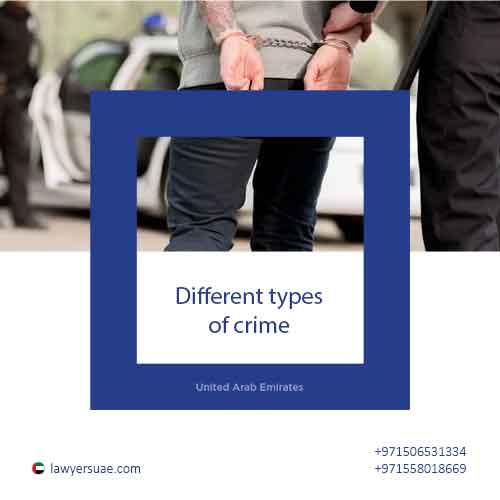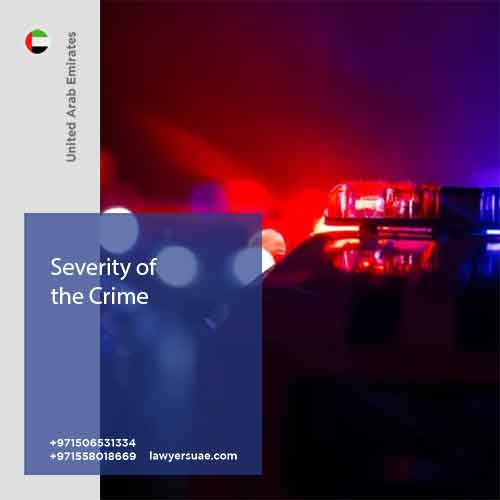Criminal law in Dubai, Abu Dhabi or the UAE is a branch of law that covers all offences and crimes committed by an individual against the country or any of the emirates. Its purpose is to clearly put a borderline of what is considered unacceptable to the nation and the society in the Emirates of Abu Dhabi and Dubai.
The United Arab Emirates (UAE) has a unique legal system that derives from a combination of Islamic (Sharia) law, as well as some aspects of civil law and common law traditions. Crimes penalty in Dubai and offenses in the UAE fall under three main categories – contraventions, misdemeanors, and felonies – with categorization determining potential criminal punishment and criminal penalty in Dubai.
We provide an overview of key aspects of the UAE criminal law system, including:
- Common crimes and offenses
- Types of crime punishments
- The criminal justice process
- Rights of the accused
- Advice for visitors and expats
UAE Criminal Law Across the Regions of Dubai and Abu Dhabi
The UAE legal system reflects cultural and religious values rooted in the country’s history and Islamic heritage. Law enforcement agencies like the police aim to promote public safety while respecting local customs and norms.
- Sharia principles from Islamic jurisprudence influence many laws, especially around morals and behavior.
- Aspects of civil law from French and Egyptian systems shape commercial and civil regulations.
- Principles of common law affect criminal procedure, prosecution, and rights of the accused.
The resulting justice system incorporates elements of each tradition, adapted to the UAE’s unique national identity.

Key principles underlying criminal law include:
- Presumption of innocence – The accused is considered innocent until evidence proves guilt beyond reasonable doubt.
- Right to legal counsel – The accused has a right to an attorney for their legal defense throughout a trial.
- Proportional Crime punishments – Sentences aim to fit the severity and circumstances of a crime.
Punishments for serious crimes can be severe per Sharia principles, but rehabilitation and restorative justice are increasingly emphasized.
Key Types of Crimes and Offenses in Dubai
The UAE Penal Code defines a broad range of behaviors considered criminal offenses. Key categories include:
Violent/Personal Crimes
- Assault – Violent physical attack or threat against another person
- Robbery – Stealing of property through force or threat
- Murder – Unlawful killing of a human being
- Rape – Forced non-consensual sexual intercourse
- Kidnapping – Unlawfully seizing and detaining a person
Property Crimes
- Theft – Taking property without the owner’s consent
- Burglary – Unlawful entry to steal from a property
- Arson – Destroying or damaging property through intentional fire
- Embezzlement – Stealing assets entrusted to someone’s care
Financial Crimes
- Fraud – Deceit for unlawful gain (fake invoices, ID theft, etc.)
- Money laundering – Concealing illegally obtained funds
- Breach of trust – Dishonest misuse of property entrusted to you
Cybercrimes
- Hacking – Illegally accessing computer systems or data
- Identity theft – Using someone else’s identity to commit fraud
- Online scams – Tricking victims into sending money or information
Drug-Related Offenses
- Trafficking – Smuggling illegal substances like marijuana or heroin
- Possession – Having illegal drugs, even in small amounts
- Consumption – Taking illegal substances recreationally
Traffic Violations
- Speeding – Exceeding designated speed limits
- Dangerous driving – Operating vehicles recklessly, risking harm
- DUI – Driving under the influence of drugs or alcohol
Other crimes include offenses against public decency like public intoxication, relationship taboos like extramarital affairs, and actions considered disrespectful of religion or local cultural values.
Expats, tourists, and visitors also frequently unintentionally commit minor public order offenses, often due to cultural misunderstandings or lack of awareness of local laws and norms.
Punishments and Penalties in both the emirates of Dubai and Abu Dhabi
Punishments for crimes aim to fit the severity and intent behind offenses. Possible criminal sentences include:
Fines as Penalty
Monetary penalties scaling based on the crime and circumstances:
- Minor traffic fines of a few hundred AED
- Major fraud charges incurring fines of tens of thousands of AED
Fines often accompany other punishments like imprisonment or deportation.
Imprisonment as Punishment in UAE
Jail time lengths depending on factors like:
- Type and severity of crime
- Use of violence or weapons
- Prior offenses and criminal history
Drug trafficking, rape, kidnapping and murder often incur decades-long prison sentences. The Punishment for Abetment or assisting in the commission of these crimes may also result in imprisonment.
Deportation as a Felony Punishment in Dubai
Non-citizens found guilty of crimes may be deported and banned from the UAE for extended time periods or life.
Corporal and Capital Punishment
- Flogging – Whipping as punishment for moral offenses under Sharia law
- Stoning – Rarely used for adultery convictions
- Death penalty – Execution in extreme murder cases
These controversial sentences reflect the UAE legal system’s foundations in Islamic law. But they are rarely implemented in practice.
Rehabilitation initiatives provide counseling and vocational training to reduce repeat offenses after release. Non-custodial alternative sanctions like community service aim to reintegrate criminals into society.
Criminal Justice System Process in UAE
The UAE justice system involves extensive procedures from initial police reports through criminal trials and appeals. Key steps include:
- Filing a Complaint in Dubai – Victims or witnesses formally report alleged crimes to the police
- Investigation – Dubai Police gather evidence and build a case file for prosecutors
- Prosecution – Dubai Government lawyers assess charges and argue for conviction
- Trial – Judges from Dubai Courts hear arguments and evidence in court before issuing verdicts
- Sentencing – Convicted defendants receive punishments in Dubai based on the charges
- Appeals – Higher appeal courts or cassation review and potentially overturn convictions
At every stage, the accused has rights to legal representation and due process as enshrined in UAE law.
Rights of the Accused
The UAE Constitution upholds civil liberties and due process rights, including:
- Presumption of innocence – Burden of proof rests on the prosecution rather than defendant
- Access to attorney – Mandatory legal representation in felony cases
- Right to interpreter – Translation services ensured for non-Arabic speakers
- Right to appeal – Chance to contest rulings in higher courts
- Protection from abuse – Constitutional provisions against arbitrary arrest or coercion
Respecting these rights prevents false or coerced confessions, helping ensure fair outcomes.
Legal Advice for Visitors and Expats in Dubai
Given cultural gaps and unfamiliar laws, tourists and expats often unintentionally commit minor violations. Common issues include:
- Public drunkenness – Heavily fined and warned, or deported
- Indecent acts – Immodest behavior, dress, public displays of affection
- Traffic violations – Signage often only in Arabic, fines strictly enforced
- Prescription drugs – Carrying undesignated medication
If detained or charged, key steps include:
- Remain calm and cooperative – Respectful interactions prevent escalation
- Contact consulate/embassy – Notify officials who can provide assistance
- Secure legal help – Consult qualified lawyers familiar with the UAE system
- Learn from mistakes – Utilize cultural training resources before traveling
Thorough preparation and awareness helps visitors avoid legal troubles abroad.
The UAE prioritizes public order and safety through a legal system blending Islamic and civil law traditions. While some punishments seem harsh by Western standards, rehabilitation and community well-being are increasingly emphasized over retaliation.
However, potentially severe penalties mean expats and tourists must exercise caution and cultural sensitivity. Understanding unique laws and customs helps prevent legal troubles. With prudent respect for local values, visitors can fully enjoy the UAE’s hospitality and amenities.
Reach us at +971506531334 or +971558018669 to discuss how we can help you in your criminal case in Dubai.
Frequently Asked Questions
What is unique about the UAE legal system compared to other countries?
The UAE blends aspects of Islamic Sharia law, French/Egyptian civil law, and some common law procedures from British influence. This hybrid system reflects the country’s cultural heritage and modern priorities.
What are some examples of common tourist crimes and offenses in the UAE?
Visitors often unintentionally commit minor public order crimes like public drunkenness, indecent clothing, public displays of affection, traffic violations, and carrying medications like prescription narcotics.
What should I do if arrested or accused of a crime in Dubai or Abu Dhabi?
Remain calm and cooperative with authorities. Secure legal representation right away – the UAE requires lawyers for felony cases and allows them for misdemeanors. Respectfully follow police instructions but know your rights.
Can I drink alcohol or show public affection with my partner in the UAE?
Drinking alcohol is heavily restricted. Only consume it legally inside licensed venues like hotels and restaurants. Public affection with romantic partners is also prohibited – limit contact to private settings.
How can crimes be reported and legal complaints filed with UAE authorities?
To formally report a crime, file a complaint at your local police station. Dubai Police, Abu Dhabi Police, and the general Emergencies number all accept official complaints to trigger criminal justice proceedings.
What are some examples of property & financial crimes and their punishments in the UAE?
Fraud, money laundering, embezzlement, theft, and burglary often lead to jail sentences + restitution fines. Arson carries up to 15 years imprisonment given fire’s risks in dense UAE cities. Cybercrimes also result in fines, device confiscations, deportations or imprisonment.
Can I bring my regular prescription medication when traveling to Dubai or Abu Dhabi?
Carrying undesignated drugs, even common prescriptions, risks detention or charges in the UAE. Visitors should research regulations thoroughly, request travel permissions, and keep doctor’s prescriptions close at hand.
How can a local UAE Advocate Help you for your Criminal Case
As stated under Article 4 of the General Provisions of Federal Law No. 35/1992, any person accused of a felony of life imprisonment or death must be assisted by a credible lawyer. If the person could not afford to do so, the court shall appoint one for him.
Generally, the prosecution has the exclusive jurisdiction to carry out the investigation and directs indictments according to the provisions of the law. However, some cases listed in Article 10 of Federal Law No. 35/1992 do not need the prosecutor’s aid, and the complainant may file the action himself or through his legal representative.
It is important to note that, in Dubai or the UAE, the qualified Emirati Advocate must be well-versed in Arabic and has the right to an audience; otherwise, they seek the help of an interpreter after taking an oath. Noteworthy is the fact the criminal actions expire. Withdrawal or death of the victim would lapse the criminal action.
You will need a UAE lawyer who can help you navigate your way through the criminal justice system for you to get the justice you deserve. For without the assistance of a legal mind, the law will not help the victims who need it the most.
Your legal consultation with us will help us to understand your situation and concerns. If you or a loved one are facing criminal charges in the UAE, we can help.
Contact us to schedule a meeting. We have the best criminal lawyers in Dubai or Abu Dhabi to help you out. Getting criminal justice in Dubai can be a bit overwhelming. You need a criminal lawyer who is knowledgeable and experienced in the country’s criminal justice system. For urgent Calls +971506531334 +971558018669


